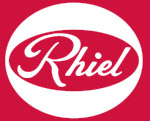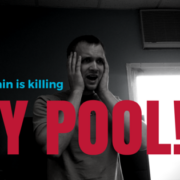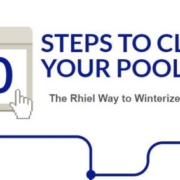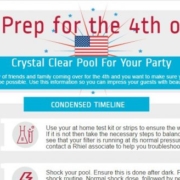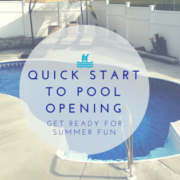What Do I Do About All Of This Rain?
As you already know, there has been a significant amount of rain over the past few weeks. This not only keeps you from using your pool, but it also creates problems for your swimming pool maintenance. I wanted to take a second to answer a few questions I have been asked during the past few days. The questions are as follows:
- All of this rain has increased the water level in my pool; what is the best way to drain it?
- What can I be doing to make sure this rain doesn’t create a problem in my pool?
- I have already spent a ton of money on chemicals this year; what is the best way to do my pool maintenance with minimal time, effort, and money?
All of these are big concerns that you might currently be worrying about so it is my goal to help you keep your swimming pool crystal clear and safe for swimming.
ALL OF THIS RAIN HAS INCREASED THE WATER LEVEL IN MY POOL; WHAT IS THE BEST WAY TO DRAIN IT?
This largely depends on your equipment setup, but I’ll try to address this question the best I can. I’ll list some common equipment and the best way to drain water using each. If you don’t find something that works for you then email me your equipment setup at marketing@rhiel.com and I will find the best solution for you.
For all these methods be sure to drain before adding any chemicals. This will reduce waste and save you money! Also keep in mind that the water should be lowered just about an inch below the top of the skimmer to the skimmer to do its job.
Sand Filter
If you have a sand filter then the best thing for you to do would be to shut off your pump, turn your valve to “Waste”, and then turn the pump back on. This will send water straight from the pool out your backwash port. Run this until you reach the appropriate water level (half way down the skimmer opening for most pools) and then turn of the pump, set the valve to filter and turn the pump back on.
Make sure your backwash port is draining to an area that can handle the amount of water you need to drain. If it isn’t draining to a good place stop into one of our stores and we can help you brainstorm a solution that will work for you!
Cartridge Filters
For Cartridge filters your best bet is to unscrew the drain plug and drain from there. To do this turn off the pump, remove this cap, and then turn back on the pump, water will begin pouring out. Putting a plug in the return can help ensure that the water doesn’t reenter the pool. With this method you can let gravity pull the water out (if it is above ground) or you can turn on the pump to speed up the process.
Make sure the water drains to an appropriate place. If that is where your filter is then that’s fine, but if it needs to go elsewhere you should attach a backwash hose and drain to an appropriate spot. If you need help hooking that up come pay us a visit and well help you make something work.
D.E.
D.E. filters are a bit different because there are so many variations. The thing to do in this case is to turn off your pump, open the drain cap, and let gravity pull the water out. Just like a cartridge filter you may need to use a backwash hose to route water somewhere else.
WHAT CAN I BE DOING TO MAKE SURE THE RAIN DOESN’T CREATE A PROBLEM IN MY POOL?
I HAVE ALREADY SPENT A TON OF MONEY ON CHEMICALS THIS YEAR; WHAT IS THE BEST WAY TO DO MY POOL MAINTENANCE WITH MINIMAL TIME, EFFORT, AND MONEY?
 I didn’t forget to answer question 2, I intentionally am answering these questions together because the answers are the same. The best thing you can do is routinely monitor your pool. This could be daily, every other day, or depending on your system, weekly. By monitor I mean pay attention to slight changes in clarity or color (this means you can’t leave your solar cover on for more than a day at a time) and also test your water at least once a week. With the poor weather we have had I would suggest testing at least every other day.
I didn’t forget to answer question 2, I intentionally am answering these questions together because the answers are the same. The best thing you can do is routinely monitor your pool. This could be daily, every other day, or depending on your system, weekly. By monitor I mean pay attention to slight changes in clarity or color (this means you can’t leave your solar cover on for more than a day at a time) and also test your water at least once a week. With the poor weather we have had I would suggest testing at least every other day.
The question now is what do you test for? You are particularly focusing on alkalinity and sanitizer. These two are very important in having a chemically balanced pool. If you notice that either reading is off then take the appropriate action to correct. If you do not know what your ideal readings should be or how to change them then stop into one of our locations or give us a call. Also if your levels are severely off then bring a water sample into our store for testing.
Keep in mind: A water sample or test should never be done during or immediately following the rain. Not doing this can result in an inaccurate test result and the addition of an unnecessary amount of chemical.
*During periods of heavy rain, monitoring alkalinity is especially important. This is because alkalinity buffers your pH by acting as guard against the generally acidic environment in which we live.
This all well and good, but how does it save you time, money, and effort? The bottom line is that regular and routine maintenance is the best thing you can do to prevent swimming pool issues.
I hope this has been helpful and that you can use this information to keep your pool crystal clear all summer long!
